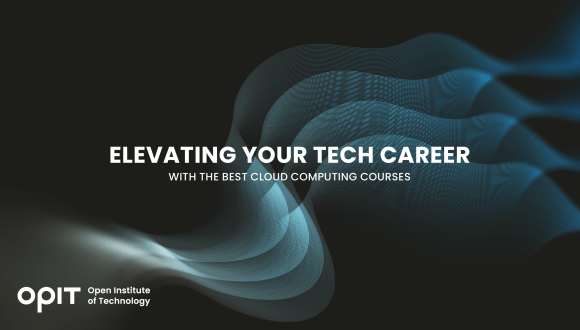

There was a time when cloud computing was nothing more than an interesting concept, but today the cloud computing industry is worth in the region of $371 billion. Businesses are leveraging the power and scalability of cloud computing due to its flexibility, enhanced security and cost savings realized through the reduction of expensive IT infrastructure maintenance.
Those professionals who are intent on becoming leaders in the ever-evolving world of cloud computing need appropriate skills and a world-class qualification, and that means finding the best cloud computing courses.
Understanding Cloud Computing and Its Courses
Cloud computing focuses on the delivery of computing services over the internet. These services can include database management, server hosting, storage, networking, online software solutions, and analytics. A recognized qualification in cloud computing will incorporate course content covering these areas and is essential for cloud innovators and future leaders.
Discovering the Best Cloud Computing Courses
A career in cloud computing provides a wealth of choice. There are qualifications that will prepare the student for a career as a Cloud Architect, Cloud Engineer, developer, or consultant. There are also more specialized careers involving cloud security or operations management. The key to a successful career in any of these fields is selecting the best cloud computing courses and qualifications.
Qualifications that will put the aspirant cloud expert on the fast track to success will be offered by recognized and certified educational institutions. Coursework should ideally cover both theoretical foundations and the practical application of skills.
Some criteria to consider when choosing the best cloud computing courses:
- Comprehensive Curriculum. Ensure that the coursework of their chosen qualification covers the skills required for career advancement. Ideally, it should include foundational cloud concepts, infrastructure management, security, practical implementation, and vendor-specific training, depending on the desired career path.
- Appropriate Teaching Methodology. Identify education providers that offer platforms including a mix of learning formats. Prioritize coursework that includes virtual instructor-led lectures, hands-on experience, real-world projects, and cloud sandboxes to allow for knowledge and application testing.
- Flexible Offerings. Many potential students will already have careers. Even those who do not hold full-time positions may be time-poor. The best cloud computing courses will make allowances for this by offering accessible and flexible options for study.
- Reputation and Accreditation. Prioritize offerings from reputable educational institutions that are acknowledged by industry leaders. The providers should be accredited by recognized regulatory bodies, offering industry leaders and organizations peace of mind when evaluating a potential employee.
Here are the top five cloud computing courses available on- and off-line to help get you started:
1. OPIT BSc in Modern Computer Science
The fully accredited OPIT BSc in Modern Computer Science provides students with the flexibility of online and fully remote coursework and study. The degree was developed to provide students with comprehensive foundation skills, both theoretical and practical. Courses include programming, software development, database management, cloud computing, cybersecurity, data science and artificial intelligence.
2. Introduction to Amazon Web Services Cloud Computing
Amazon Web Services (AWS) is the world’s leading cloud computing platform. This beginner-friendly “Introduction to Cloud Computing on AWS” qualification will provide hands-on, practical skills related to both fundamental cloud computing concepts and advanced AWS competencies.
The coursework consists of seven hours of easily accessible video and two articles. Content can be accessed online, and the successful student will receive a certificate of completion. The skills obtained during the study are perfect for those who want to progress to either a qualification as an AWS Certified Cloud Practitioner or an AWS Certified Solutions Architect.
3. Udemy – Getting Started With Cloud Computing – Level 1
This Udemy program provides a grounding in some fundamental cloud computing concepts. It includes course content such as cloud fundamentals and the five basic concepts that underpin cloud computing. The coursework also covers an introduction to service models such as SaaS, PaaS, and IaaS, and deployment models (private, public, hybrid, and community).
4. Coursera Cloud Computing Concepts (Part 1)
This flexible 23-hour course will provide foundational skills in distributed algorithms, distributed and cloud computing, and C++. Students will have access to industry experts to get a practical understanding of cloud computing and related subjects. Coursework includes hands-on projects that are relevant to individual career paths. A shareable ‘career certificate’ ideal for LinkedIn use is available to those obtaining the qualification.
5. Udemy Ultimate AWS Certified Solutions Architect Associate SAA-C03
This course is among the best cloud computing courses available. It is ideal for aspirant professionals who want to take their AWS qualifications to the next level. The coursework is flexible and allows students access to 800+ explanatory slides and a practice exam (with answer explanations). Students will have the opportunity to learn solution architecture analysis and database management, AWS fundamentals, and the implementation of real-world architecture using AWS.
The Skills You Gain From Top Cloud Computing Courses
Qualifications offered by accredited education institutions will provide both foundational and advanced competencies in cloud-related subjects. Students will obtain theoretical and practical knowledge that will advance their careers in the ever-evolving world of cloud computing.
A diverse skillset, including subjects such as database management, coding, and understanding the complexities of the various cloud solutions available is essential for those who are committed to a career in the cloud. However, these skills are not only applicable to the domain of cloud computing. Many are highly sought-after skills that are perfect for various IT and digital business roles, giving degree-holders options about their career trajectories.
Choosing the Right Course for Your Career Goals
The explosion of cloud applications and functionality provides enormous scope for a variety of career paths. These can include careers in cloud architecture, cloud application development, systems administration, front-end development, business consulting, cloud security, and data science, among many others.
The key to a successful cloud-based career is to understand the various career paths available and to ensure that the chosen path helps meet career objectives. An essential part of this journey is focusing on the best cloud computing courses.
How OPIT’s Cloud Computing Course in the BSc in Modern Computer Science Stands Out
The OPIT BSc in Modern Computer Science has become the preferred choice of those who want to fast-track their career in cloud computing. The coursework for the program provides the student with foundational, advanced, and real-world skills and leverages state-of-the-art tools and input from industry leaders and academic experts to provide actionable learning.
Flexibility and remote learning make this qualification the ideal choice for those who simply cannot commit to full-time study.
OPIT (Open Institute of Technology) is a fully licensed and accredited online higher education, a factor that can influence hiring decisions. It is recognized by the MFHEA under the European Qualification Framework (EQF) and the Malta Qualification Framework (MQF).
A Cloud Computing Qualification – Your Key to Success
The cloud is today part and parcel of the modern business environment, and it continues to evolve. This continued evolution provides incredible opportunities for the business leaders of tomorrow.
Carefully researching the best cloud computing courses is the key to success in the growing industry. However, the prospective student needs to take extra care when selecting their desired qualification and area of study. The coursework should complement the student’s chosen career path and offer the flexibility to study when and where they want.
OPIT is recognized as a premium education provider. The recognition of OPIT accreditation from leading standards authorities lends further weight to any qualification received from this respected institution. A qualification from OPIT opens the door to a stimulating and rewarding career at the cutting edge of cloud development.
Related posts

Source:
- EFMD Global, Published on July 12th, 2024.
By Stephanie Mullins
Many people love to read the stories of successful business school graduates to see what they’ve achieved using the lessons, insights and connections from the programmes they’ve studied. We speak to one alumnus, Riccardo Ocleppo, who studied at top business schools including London Business School (LBS) and INSEAD, about the education institution called OPIT which he created after business school.
Please introduce yourself and your career to date.
I am the founder of OPIT — Open Institute of Technology, a fully accredited Higher Education Institution (HEI) under the European Qualification Framework (EQF) by the MFHEA Authority. OPIT also partners with WES (World Education Services), a trusted non-profit providing verified education credential assessments (ECA) in the US and Canada for foreign degrees and certificates.
Prior to founding OPIT, I established Docsity, a global community boasting 15 million registered university students worldwide and partnerships with over 250 Universities and Business Schools. My academic background includes an MSc in Electronics from Politecnico di Torino and an MSc in Management from London Business School.
Why did you decide to create OPIT Open Institute of Technology?
Higher education has a profound impact on people’s futures. Through quality higher education, people can aspire to a better and more fulfilling future.
The mission behind OPIT is to democratise access to high-quality higher education in the fields that will be in high demand in the coming decades: Computer Science, Artificial Intelligence, Data Science, Cybersecurity, and Digital Innovation.
Since launching my first company in the education field, I’ve engaged with countless students, partnered with hundreds of universities, and collaborated with professors and companies. Through these interactions, I’ve observed a gap between traditional university curricula and the skills demanded by today’s job market, particularly in Computer Science and Technology.
I founded OPIT to bridge this gap by modernising education, making it affordable, and enhancing the digital learning experience. By collaborating with international professors and forging solid relationships with global companies, we are creating a dynamic online community and developing high-quality digital learning content. This approach ensures our students benefit from a flexible, cutting-edge, and stress-free learning environment.
Why do you think an education in tech is relevant in today’s business landscape?

As depicted by the World Economic Forum’s “Future of Jobs 2023” report, the demand for skilled tech professionals remains (and will remain) robust across industries, driven by the critical role of advanced technologies in business success.
Today’s companies require individuals who can innovate and execute complex solutions. A degree in fields like computer science, cybersecurity, data science, digital business or AI equips graduates with essential skills to thrive in this dynamic industry.
According to the International Monetary Fund (IMF), the global tech talent shortage will exceed 85 million workers by 2030. The Korn Ferry Institute warns that this gap could result in hundreds of billions in lost revenue across the US, Europe, and Asia.
To address this challenge, OPIT aims to democratise access to technology education. Our competency-based and applied approach, coupled with a flexible online learning experience, empowers students to progress at their own pace, demonstrating their skills as they advance.
Read the full article below:

Source:
- The European, Summer 2024 Edition, Page 24
With careful planning, ethical considerations, and ensuring human oversight is maintained, AI can have huge market research benefits, says Lorenzo Livi of the Open Institute of Technology.
By Lorenzo Livi
To market well, you need to get something interesting in front of those who are interested. That takes a lot of thinking, a lot of work, and a whole bunch of research. But what if the bulk of that thinking, work and research could be done for you? What would that mean for marketing as an industry, and market research specifically?
With the recent explosion of AI onto the world stage, big changes are coming in the marketing industry. But will AI be able to do market research as successfully? Simply, the answer is yes. A big, fat, resounding yes. In fact, AI has the potential to revolutionise market research.
Ensuring that people have a clear understanding of what exactly AI is is crucial, given its seismic effect on our world. Common questions that even occur amongst people at the forefront of marketing, such as, “Who invented AI?” or, “Where is the main AI system located?” highlight a widespread misunderstanding about the nature of AI.
As for the notion of a central “main thing” running AI, it’s essential to clarify that AI systems exist in various forms and locations. AI algorithms and models can run on individual computers, servers, or even specialized hardware designed for AI processing, commonly referred to as AI chips. These systems can be distributed across multiple locations, including data centres, cloud platforms, and edge devices. They can also be used anywhere, so long as you have a compatible device and an internet connection.
While the concept of AI may seem abstract or mysterious to some, it’s important to approach it with a clear understanding of its principles and applications. By promoting education and awareness about AI, we can dispel misconceptions and facilitate meaningful conversations about its role in society.
Read the full article below:
- The European, Pages 24 to 26.
Have questions?
Visit our FAQ page or get in touch with us!
Write us at +39 335 576 0263
Get in touch at hello@opit.com
Talk to one of our Study Advisors
We are international
We can speak in:


